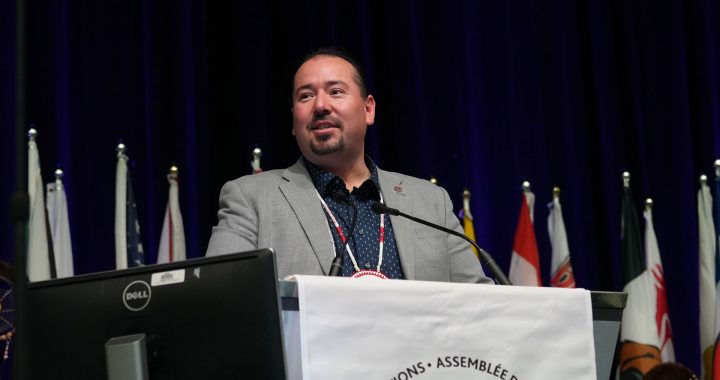When Emily Mandamin received an email from the Toronto Raptors basketball team, she immediately assumed it was fake.
But it was the real deal. And just a few short months later, Mandamin’s face is now on the sides of buses and streetcars in Toronto.
It’s part of a partnership between the Raptors and the Toronto Transit Commission to celebrate the contributions of Indigenous athletes to Canadian sport at home and on the international stage.
Mandamin, who is from Iskatewizaagegan 39 Independent First Nation, also known as Shoal Lake #39 in northwestern Ontario, is one of eight athletes being showcased.
“This biggest thing that I hope is taken away is that there is representation of athletes like me, alongside the other athletes that are on these buses with me and that did this campaign,” says Mandamin, 17, on the latest episode of Face to Face.
“Growing up as a young girl on the reservation, I didn’t have many people to look up to or even to go to for advice on this journey that I’m on. So, I hope that there’s a little girl or a little boy walking downtown and he sees me on the bus and says ‘Wow, there’s somebody that looks like me, somebody that comes from where I come from’ and so that’s kind of been the biggest message I hope is that Indigenous athletes are rising, if they give us the resources, we can be great.”
Teaming up with the Raptors and TTC isn’t the only big partnership this year for Mandamin. Earlier this year, Ontario Lottery and Gaming and NBA Canada partnered to help tell her story.
“For me, the basketball court was always a safe space,” she says. “Growing up in the community, there’s a lot of different things that we deal with whether that’s substance abuse, mental health issues, poverty rates, and so I found myself on the basketball court at a young age looking for a better lifestyle and a way to express myself as a young girl.
“A lot of my older cousins were there playing basketball late at night trying to find a better way out and trying to find a better way out and just spending time in a positive way.
There were a lot of memories made there and so that was the biggest thing, fixing up that basketball court for the generations that come after so they could also have a place to play.”
She is the first person from her First Nation to be offered a full basketball scholarship for college.
Mandamin had 13 offers from institutions in the United States and Canada.
She settled on Highland College in Illinois but has also played for women’s college basketball teams in Kansas and Texas.
This past summer, Mandamin committed to play for the University of Manitoba Bisons.
It’s a homecoming for Mandamin who moved to Winnipeg in her teens to play basketball.
She’s hoping to have a big year as she continues to chase her dreams of playing in the WNBA.
Mandamin says basketball has given her the tools to continue her education and travel the world.
Her story is one she likes to share with other Indigenous youth.
“I know the challenges that they go through and I’ve lived it, I’ve seen it, I’ve been through it. So, sharing my experience and the way I’ve dealt with that has been something that I like to talk to these youth about because I understand,” she says.
“Being somebody that’s come from the same place as them, I want to show them that doing things like this is possible and I want them to be better and greater than me. So, that’s kind of been the biggest thing, I talk about my experiences with basketball and with life in general and how basketball has been a tool to navigate my entire life.
“So, I talk about the importance of sport and the importance of self-care and self being.”













